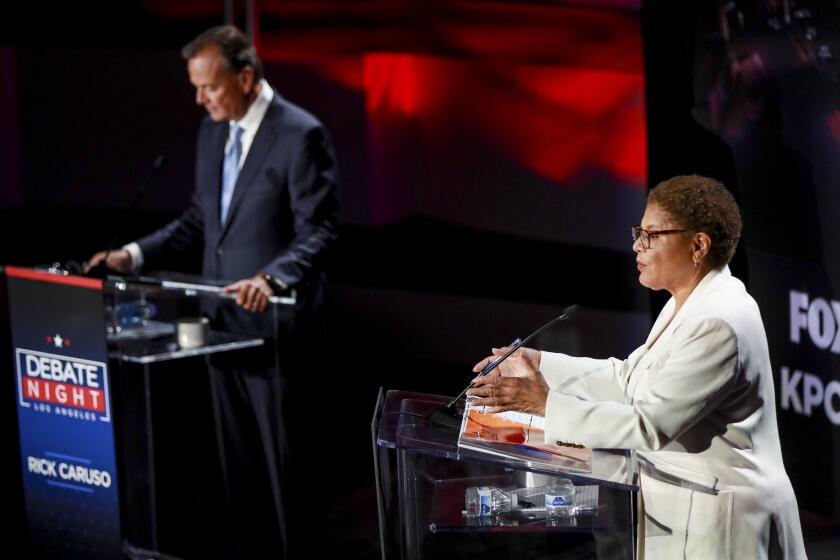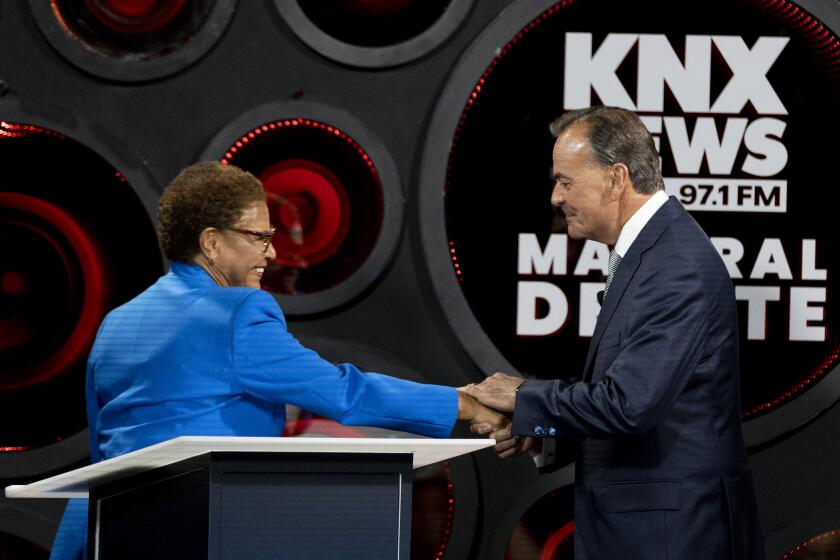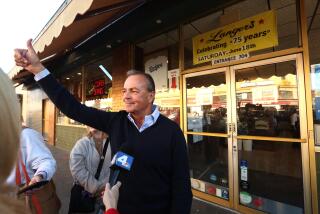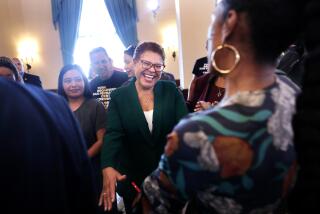Column: Why I’m voting against Rick Caruso. (Hint: It’s not because of his positions on the issues.)
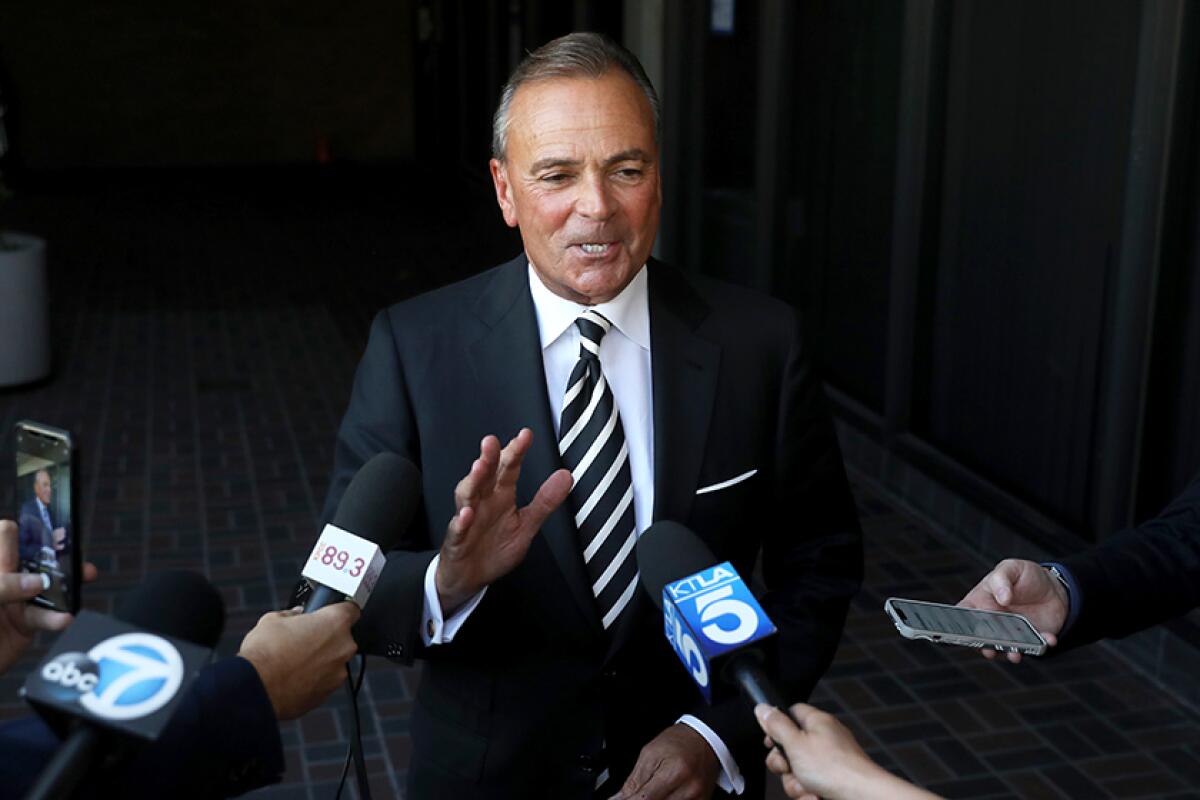
- Share via
Karen Bass wants to hire 500 new LAPD officers while Rick Caruso wants 1,800 more. Bass plans to house 17,000 homeless people in her first year as mayor; he promises 30,000. He excoriates her for accepting free tuition from USC, while she says he broke a promise to spend $1 million backing a pro-choice ballot measure.
This is important stuff, undoubtedly. I’ve listened, I’ve considered, I’ve compared.
But at the end of the day, when I walk into my polling station on Nov. 8 to help choose a new mayor of Los Angeles, I will vote against Caruso, and not because his vision is so much worse than hers or because I think 500 new cops is more appropriate than 1,800.
I’m voting no on Caruso — as I believe all Angelenos should — to stand up for the battered but crucial principle that elections shouldn’t be bought, and to register my official opposition to the rotten, fetid influence of big money in politics.
Opinion Columnist
Nicholas Goldberg
Nicholas Goldberg served 11 years as editor of the editorial page and is a former editor of the Op-Ed page and Sunday Opinion section.
For the record, I don’t think that being rich makes Caruso a bad man. Nor am I convinced he’d be a bad mayor. And I acknowledge that he’s got the legal right to spend his entire fortune on his campaign if he chooses to. That’s how our country works, unfortunately.
But I’m not going to help him win.
According to the latest reports, Caruso is outspending Bass by a factor of 10 to 1. She’s spent $6 million since entering the race, while he’s spent $62 million. That $62 million comes overwhelmingly from his personal $5.3 billion fortune, which he amassed building malls around Southern California.
The enormous spending disparity was disclosed in this newspaper on a Saturday. And what do you think The Times reported the very next day? “Caruso cuts into Bass’ lead, poll finds.”
Shocker! Stop the presses! Apparently he’s shown “significant progress” in “closing a large part of the gap.” Just as he did in the primary, when he spent $10 million and pushed his support from 8% in February to 24% in mid-April. He finished second, qualifying for the runoff.
Rick Caruso has spent more than $62 million, nearly all of it his own money, in the L.A. mayor’s race, according to the latest filings.
Today, Caruso still trails with likely voters, but hey, there’s time left for the money to do its work. Expect a ubiquitous barrage of slick spots about solving homelessness, cleaning up the streets and his immigrant roots.
They, along with his attacks on Bass — some of them fair, some not so much — will be seen or heard by millions of voters, while her responses, promises and counterclaims will reach only a small fraction of those voters.
In other words, they are competing on an uneven playing field that is unfair not just to Bass but to voters as well.
I’ve written before about Buckley vs. Valeo, the pernicious 1976 Supreme Court decision that equated money with speech, declaring that Americans — read: rich Americans — have a 1st Amendment right to spend unlimited sums from their personal fortunes on their own campaigns. Many of these candidates have little or no governmental experience or name recognition; they hope to spend their way into office. And despite their lack of a track record, many succeed.
Now, some people don’t think sky-high spending is such a big problem. Californians in particular like to boast about not letting their heads be turned by super-rich candidates.
Both candidates found themselves on the defensive
They bring up Al Checchi, who spent some $40 million of his own money in a Democratic primary for governor in 1998 — and lost. And Michael Huffington, who spent $28 million of his own dollars to unseat Sen. Dianne Feinstein in 1994 — and lost. And Meg Whitman, who frittered away $177 million (including some $144 million of her own money) to defeat Jerry Brown for governor in 2010 — and lost.
To which I say: Good for us for seeing through all that paid propaganda.
But let’s not get cocky. Money talks, and advertising works. Caruso would be nowhere in this race — nowhere — without his millions.
I have some experience with this. I worked in another life as a pollster on two of the then-most-expensive races in American history: Jon Corzine’s $60-million campaign to become a U.S. senator from New Jersey in 2000, and Michael R. Bloomberg’s even-more-ludicrously costly race for New York City mayor in 2001.
In the Corzine race, I watched day after day as millions of dollars in TV advertising moved an unknown, self-financing Goldman Sachs executive with no government experience steadily toward victory. I followed the daily tracking numbers as the polls tightened with the cumulative, saturating weight of his message. He won narrowly after outspending his opponent 10 to 1.
Same script for Bloomberg.
When the court ruled the rich could spend unlimited amounts of money to get elected, it was wrong.
Money isn’t always decisive. But it often is. That’s true if it comes from a self-financing billionaire or a deep-pocketed special interest group.
From 2000 through 2020, about 90% of House races and 80% of Senate races were won by the candidate who spent the most, according to the Center for Responsive Politics.
It’s true that money can’t always defeat an entrenched incumbent or highly popular candidate. Big spending is less effective when voters are more partisan or well-informed. It’s better at bringing out new voters and persuading undecided ones than at convincing people to change their minds.
But common sense tells you that grossly outspending your opponents can drown out their voices and muddy their messages.
I’m not promising to never again vote for a self-financed candidate. (And I might even have behaved differently in this race if I felt Caruso would make a far better mayor than Bass.)
But I’m tired of the way the system works. We need to rethink wrongheaded court decisions like Buckley and fight for fair and democratic campaign finance rules. Money is not speech, and unlimited spending distorts our elections.
A 10-to-1 spending ratio is simply not right.
More to Read
A cure for the common opinion
Get thought-provoking perspectives with our weekly newsletter.
You may occasionally receive promotional content from the Los Angeles Times.

